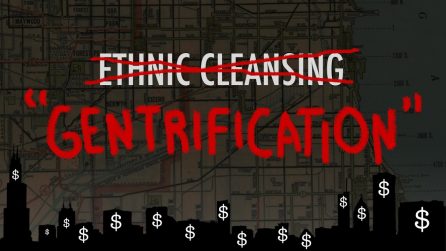One August day in 1966, Martin Luther King, Jr., arrived in a white neighborhood on Chicago’s Southwest Side to join about 700 protesters fighting housing segregation. The protesters were outnumbered by hostile counter-protesters. One held a sign saying “King would look good with a knife in his back,” according to The Chicago Tribune. Another struck King in the head with a rock, causing him to fall to one knee as bodyguards circled in to protect him.
It’s convenient to imagine that King’s struggle for racial equality was confined to the South. But King knew that racism was alive in the North as much as the South. It’s also convenient to see King’s struggle as confined to race. To King, racial injustice did not happen in isolation. It was not possible to separate racism from militarism from poverty. King stood against both imperialism and racism and understood that capitalism was the thread tying them together. In fact, King was an avowed democratic socialist. In a 1961 speech he said, “Call it democracy, or call it democratic socialism, but there must be a better distribution of wealth within this country for all God’s children.”
Even those who acknowledge King’s radicalism often try to paint it as a development that happened at the end of his life. Because he began to expand his struggle for racial justice into initiatives like the Memphis sanitation workers’ strike and the Poor People’s Campaign, there’s the appearance that his radicalism was just taking shape at the time of his assassination. But King was always a radical. He favored things like union rights and full employment as well as free education, free healthcare, and a radical redistribution of wealth.
He had deep misgivings about capitalism at least as far back as 1952. In a letter to Coretta Scott that year, he wrote “I imagine you already know that I am much more socialistic in my economic theory than capitalistic.” He continued, “Today capitalism has outlived its usefulness. It has brought about a system that takes necessities from the masses to give luxuries to the classes.”
This was more than a decade before his historic speech at the March on Washington. It was long before the Democratic party first embraced him and longer still before the party abandoned him over his strong opposition to the Vietnam war.
King won significant victories for marginalized communities by playing a role in pushing the LBJ administration to sign the Civil Rights Act of 1964 and the Voting Rights Act of 1965. But these victories speak more to the power of organized social movements to force legislative outcomes than to any fellow-feeling between MLK and the LBJ Democrats. On the contrary, American empire had a powerful disdain for King.
Perhaps the most damning example comes out of the FBI’s COINTELPRO program designed to surveil and discredit political activists. The FBI sent King an anonymous letter calling him an “evil, abnormal beast” and which ended with a threat that King interpreted as an inducement to suicide. An uncensored copy of this letter is held at the U.S. National Archives.
The great tragedy of King’s dream is that, half a century later, it remains largely unfulfilled. It has been watered down and wrung out. It’s been drained of its radicalism, and in turn, its significance. But King left us with a valuable blueprint for creating a better world. It’s only possible when people of different races, religions, and genders organize not just against one injustice or another, but against the broad power structures that prop up all injustices. King shows us that the battle for economic justice is in fact inseparable from the battle for racial justice. Dismantling capitalism will not solve all our problems, but it will bring us closer to the world King dreamed of but did not live to see.




